What Are The Best Odds For Matched Betting?
With the cost of living crisis showing no sign of easing, it’s no wonder people are turning to side hustles in increasing numbers.
Over two fifths of Brits (43%) have a side hustle, bringing in a few hundred extra pounds a month - but many end up drowning in the work generated by the combination of their regular job, their side hustle and their home responsibilities.
For a side hustle that’ll bring in extra cash without taking up all your free time, Matched Betting is probably the best option out there.
But a lot of people are put off by what can seem like an intimidating concept. If you’ve thought about taking up Matched Betting but you still have questions, we’ve got the answers - whether you want to know how much money you need to start Matched Betting, how long it takes, or whether it really is tax free.
In this article, we’ll talk about odds as they relate to Matched Betting - how they affect your profits, how to know the best odds to take, and when to be wary of the odds you bet on - to maximise your profits and keep your Matched Betting going long term.
What Is Matched Betting?
Matched Betting works by taking advantage of the offers and bonuses offered by bookmakers, which are designed to tempt new customers. By betting both for and against the outcome of an event, you’re able to turn a free bet into guaranteed profit.
Most offers run along the lines of ‘Bet £10 and get a £10 free bet’. By matching the first bet, you break even - and you can then make a profit on the free bet.
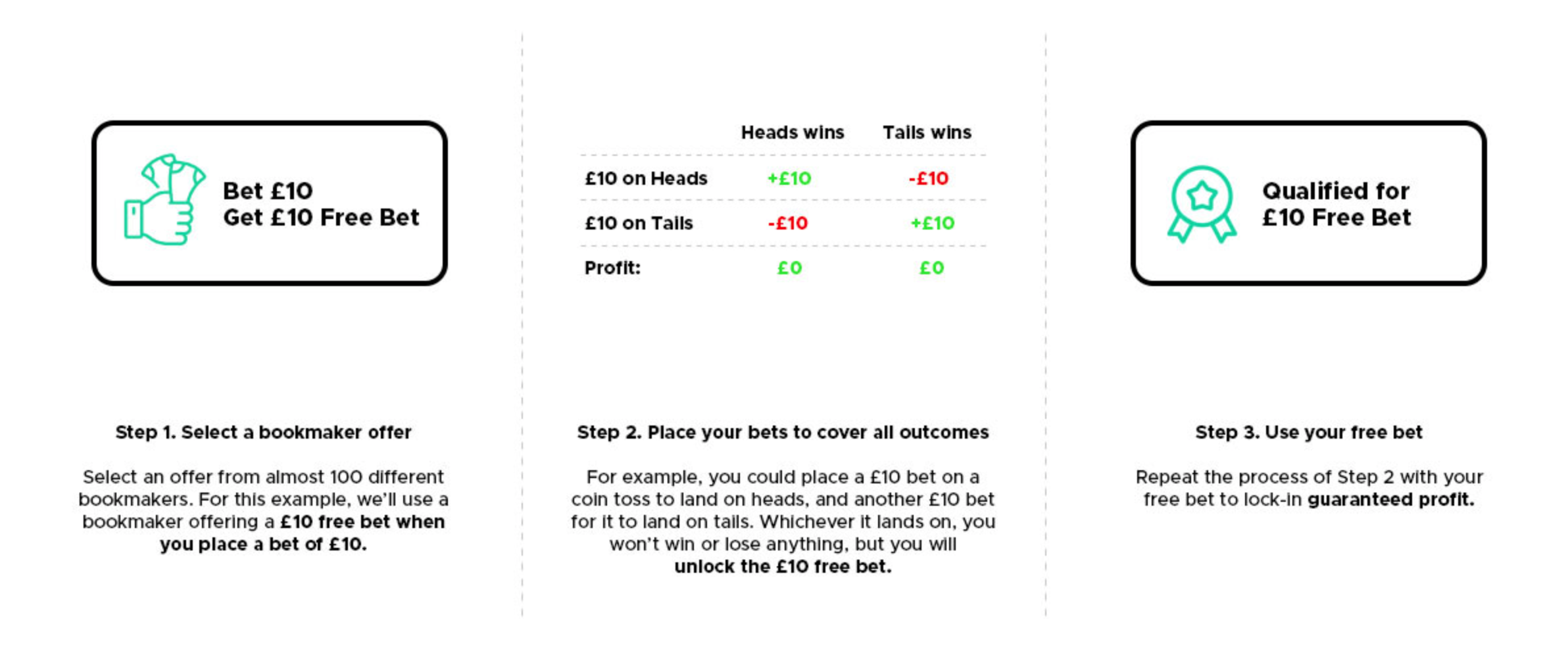
To find out more about how Matched Betting works, check out our complete guide for beginners - or, if you already understand the principles of Matched Betting, keep reading for our detailed breakdown of odds as they relate to Matched Betting.
What Are Odds?
Odds are an indication of the amount a bettor will win based on their initial stake. You’ve probably come across odds in popular culture, even if you’ve never placed a bet in real life, but not everybody has a good grasp of how they work.
Traditionally in Britain, we’ve expressed odds in the fractional format (more on types of odds formats shortly), meaning that you might have heard people say that they’re getting odds of, say, three to one (3/1), or of eight to three (8/3), on a certain outcome. Odds of 3/1 would mean that, for every £1 a bettor staked, they would win £3 if their bet was successful. Odds of 8/3, meanwhile, would mean that for every £3 staked, they would win £8.
Odds are inherently tied to probability, because a bookie will pay out more if an outcome is less likely to occur. This means that high odds (with large payouts) indicate a low probability of an outcome occurring, while low odds (with smaller payouts) indicate a higher probability of that outcome occurring.
Types of odds
There are three types of odds that you’ll commonly find on betting sites in the UK.
Fractional (British)
As we’ve seen above, fractional odds are the traditional format in Britain. Fractional odds indicate the amount you will win depending on your original stake, with the first number showing your winnings, and the second your stake. Here’s an example below:
2/1 odds indicates that for every £1 staked you will win £2 (equal to 3.0 in decimal odds and +200 in moneyline odds)
The only trouble with fractional odds is that it can be quite difficult to compare them, which isn’t at all ideal when Matched Betting, when it can be important to compare odds at a glance.
Decimal (European)
These are often considered the most straightforward, especially for beginners. With decimal odds, you simply multiply your stake by the odds to calculate your total return (including your original stake) on a bet. For example:
3.0 odds means that if you bet £1, you receive a total of £3 if your bet wins (equal to 2/1 in fractional odds and +200 in moneyline odds)
With decimal odds, a higher number simply means higher odds, making it very easy to assess whether one set of odds is better than another.
Moneyline (American)
You’re much less likely to come across moneyline odds in the UK, but it’s still useful to understand how they work. Unfortunately, they’re the most confusing odds format of all. To start with, they come in two different formats, depending on the likelihood of an outcome. For an outcome that is more likely than not to occur (i.e. a favourite), moneyline odds are expressed in the negative, while for an outcome that is less likely to occur (i.e. an underdog), the odds are expressed in the positive.
For a favourite, the odds indicate the amount you have to bet in order to win £100 (or, as they’re more commonly used in the US, $100). For an underdog, meanwhile, the odds indicate the amount of profit you’ll make if you bet £100.
+200 odds means that if you bet £100, you’ll make £200 in profit if your bet wins (equal to 2/1 in fractional odds and 3.0 in decimal odds)
-200 odds means that you need to bet £200 in order to make £100 in profit if your bet wins (equal to 1/2 in fractional odds and 1.5 in decimal odds)
Which is the best odds type for Matched Betting?
We’re firmly in favour of using decimal odds when Matched Betting. Betting sites will allow you to swap between odds formats, so, although a site may default to fractional odds, you’ll be able to swap to the decimal format.
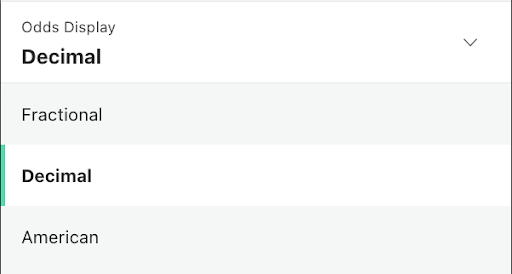
By using decimal odds, you can easily compare your back and lay odds, as well as the odds on offer for different selections, and those offered by different betting sites. Unless you’re already an experienced punter with great familiarity with fractional odds, we’d say you’re much better off - and much less likely to make a mistake - using decimal odds.
Odds Considerations When Matched Betting
If you’re a regular punter placing a bet, your main considerations will be balancing how likely the bet is to win, and how much you’ll get if it does. Matched Betting, however, is a very different story. Because you’re betting both for and against any outcome, you don’t generally care in the slightest whether your selection wins or not (though you do, of course, care about the amount of profit you’ll make).
When choosing the best selections, and the best odds, for a Matched Betting offer, the most important considerations are as follows.
Finding a close match
First and foremost, you need to find a selection where the back odds with the bookie closely match the lay odds with the exchange. The closer the match, the better, as this limits the amount you’ll lose on a qualifying bet and maximises the amount you’ll win with a free bet.
Our Oddsmatcher is here to help you track down the closest matches, comparing odds from over 100 bookmakers and betting exchanges and rating each selection up to 100% for a perfect match, allowing you to easily find the most profitable options.
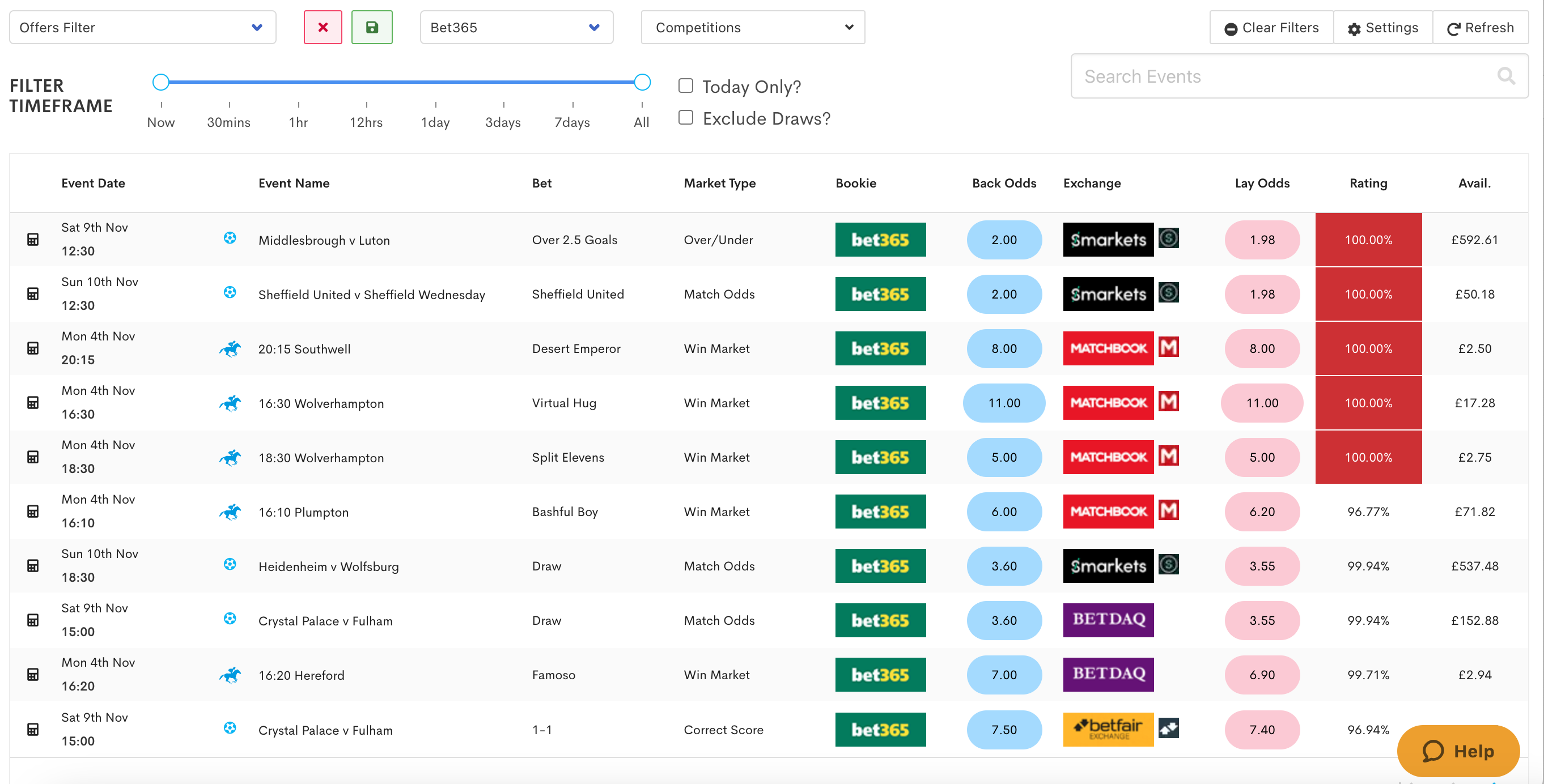
Level of profit
Having established the closest matches available to you for a particular offer, you’ll want to maximise your profit. For a regular bet and get offer, your profits will be highest if you select low odds (within the terms of the offer) for your qualifying bet, to limit your qualifying loss, and high odds for your free bet, to maximise your profit.
So for example, you might make the following selections for a bet £10 get a £10 free bet offer:
Qualifying bet of £10 (minimum odds 1.5)
Back odds 1.9
Lay odds 1.95
Qualifying loss of £-0.19
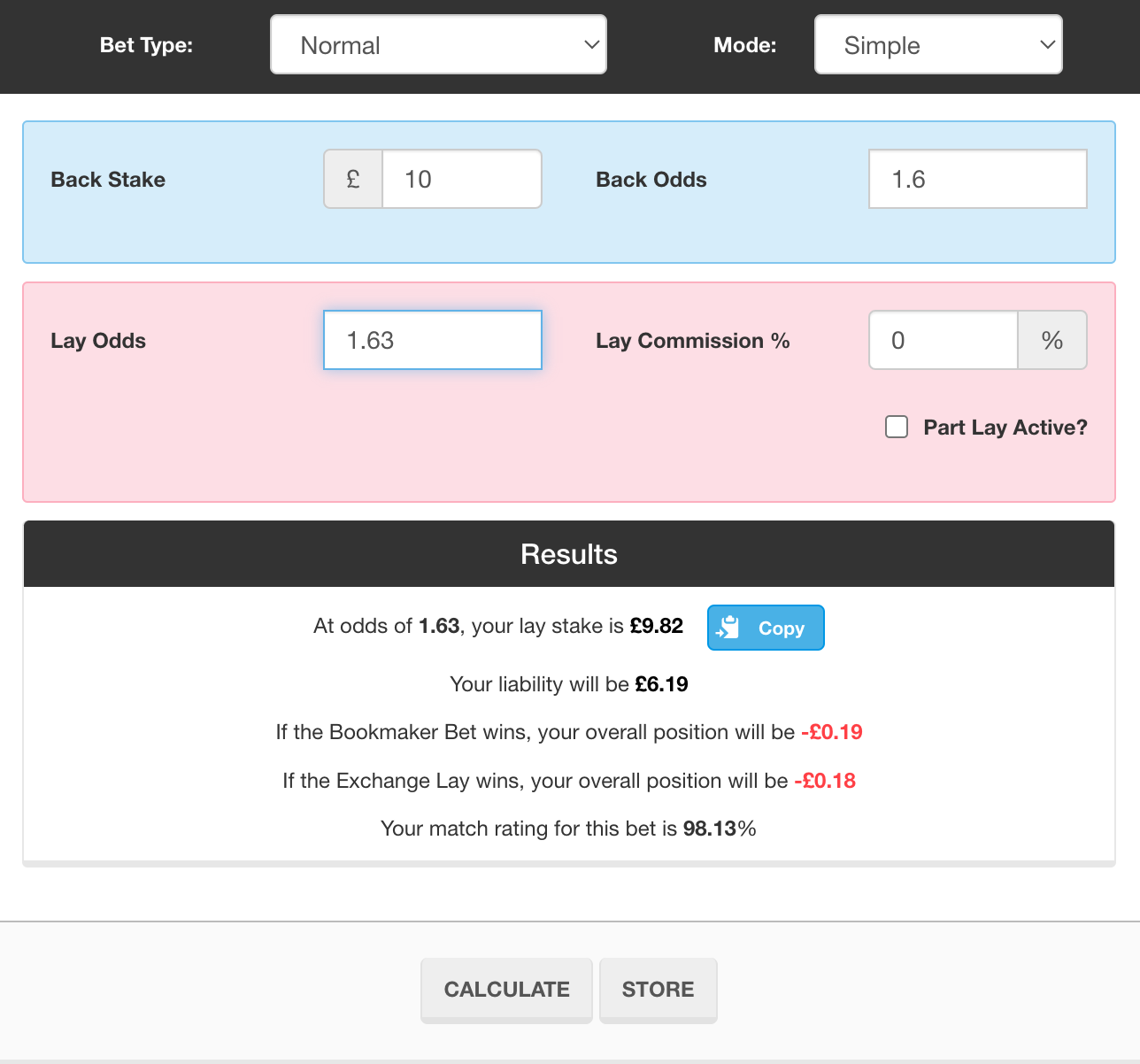
Free bet of £10
Back odds 6
Lay odds 6.5
Profit of £7.70
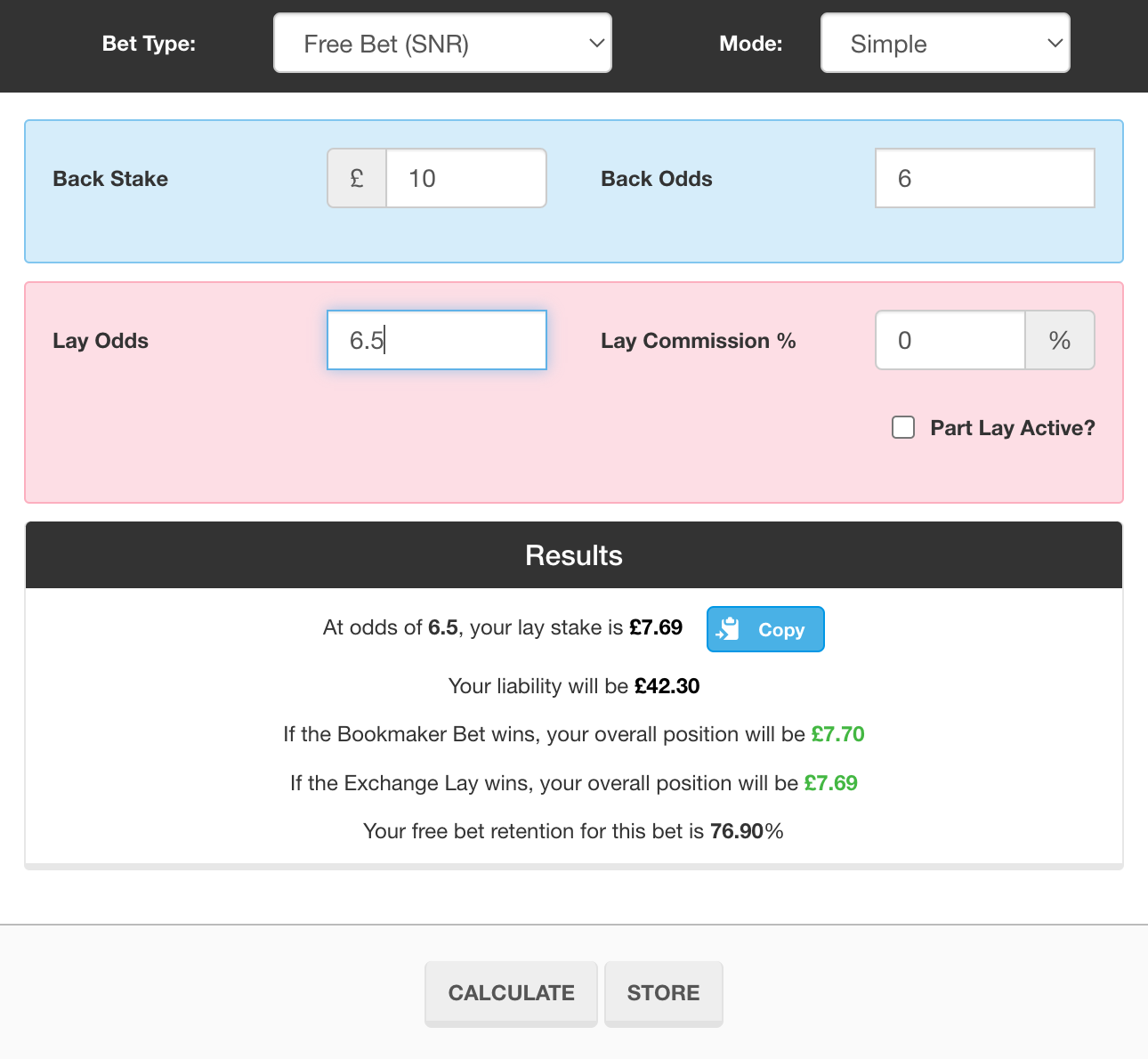
Amount of liability
When a lot of people first start Matched Betting, they may only have a limited amount of money that they can afford to devote to their new side hustle. This is absolutely fine - you can start Matched Betting with as little as £30 to spare - but it can limit your choices when you first get started.
The downside to placing your free bet at high odds is that it increases your liability at the exchange - the amount you stand to lose at the exchange if your back bet wins. The money is completely safe - if your back bet has won, that means you’ve won at least the same amount from the bookie - but it is tied up until the match or race has finished.
This means that the odds you can afford to take may depend on your bankroll. As you can see, the liability for the above free bet would be £42.30, so the bettor would need to have at least that amount available to them at the exchange to match their bet. If the odds were higher still, they’d need to have even more liquidity to match the bet.
For this reason, a matched bettor may prefer to avoid excessively high odds that would eat up all their funds at the exchange. This does become less of a consideration as you gain more experience, fortunately. Regular Matched Betting means you’ll start to build up a higher balance at the exchange from your profits, meaning you can afford to place bets with more liability.
Risk of gubbing
Being gubbed - i.e. being restricted from partaking in bookie offers - is something most matched bettors will experience at some point in their Matched Betting career, but there are measures you can take to avoid or postpone a gubbing.
There are certain betting patterns and odds selections that are obviously characteristic of a matched bettor, and steering clear of these can help you keep more of your accounts healthy for longer.
- Arbitrage betting. Arbitrage betting involves making a matched bet where the back odds are higher than the lay odds, resulting in an instant profit. Unfortunately, it’s not difficult for bookies to catch on to what you’re up to, so arbitrage betting is best avoided except on accounts that have already been gubbed.
- Obvious Matched Betting patterns. While choosing low odds for qualifying bets and high odds for free bets will maximise your profits, it can make you stand out as a likely matched bettor. Regular punters are less likely to display this pattern, as they’ll be hoping to win both bets - whereas a matched bettor doesn’t care if the bet wins or not. To better blend in, it can be helpful to go for somewhat higher odds on qualifying bets and lower odds on free bets from time to time. You may sacrifice some profit in the short term, but you’re likely to retain a healthy account in the longer term.
- Always choosing the best matches. Again, while this will contribute more to your profits, there can be downsides to always going for the best possible matches. Firstly, this might be on a very obscure event, that most regular punters wouldn’t bother with, and secondly a bookie is going to notice if you only ever choose selections where their odds are especially competitive. You can protect your account health by betting on more popular events, even if they aren’t the very closest matches available, and sometimes choosing slightly less profitable selections than the very best.
Stake size
Stake size is closely tied to liability as a consideration. The higher your stake, the higher your liability at the exchange will be. For this reason, if you’re completing an offer that requires you to stake a larger amount of money, e.g. ‘bet 20 for a £20 free bet’, you might want to choose slightly lower odds than you would otherwise, as your liability will be double that of a £10 bet.
It’s also worth bearing in mind that a regular punter probably wouldn’t bother putting a small stake on a favourite - because betting, say, £5 at odds of only 1.5 would gain them only £2.50 in winnings, which is hardly worth the bother to a lot of people. You might therefore look for odds of 2 or more (1/1 in fractional odds) for smaller stake bets, where a punter would at least double their money if they won.
Sport
The volatility of sports can vary significantly, and this has an impact on the best strategy for Matched Betting on each sport. In football, for example, a bookie’s odds are a relatively reliable indicator of the eventual outcome of a match, which means that normal bettors are much less likely to bet on a clear underdog (unless it happens to be their favourite team).
On the other hand, draws aren’t uncommon - they occur in roughly a quarter of football matches - so they can be a good way to justify betting at somewhat higher odds in matches where neither team is the runaway favourite.
Horse racing, however, is a very different kettle of fish. It’s much more common for a horse at high odds to end up winning a race, and it’s therefore also much more common for punters to risk a bet at high odds. As a result, you can get away with high odds bets on horse racing without drawing attention to yourself as a matched bettor.
What Are The Best Odds For Different Bet Types?

Although the general principles defining the best odds apply to all bet types, there can be some variation depending on the exact type of bet, and the type of offer, you’re completing.
- Bet builders. Bookies will usually set a minimum odds threshold for bet builder offers, and this can be quite high - from odds of 3 to as much as 6, depending on the bookie. You’ll also tend to have to include a minimum number of selections in your bet builder, probably at least 3. For this reason, you should try to find the lowest odds available that will fulfil the bookie’s requirements, as it tends to be more difficult to find close matches at higher odds with bet builders.
- Accumulators. Similar restrictions apply to accumulator bets, which will often have a minimum of 4 selections to count towards an offer. Again, you’ll usually want to keep your odds low, as far as possible, while still meeting the requirements for the offer. Our Acca Catcher makes this process more straightforward, finding you the best available matches for accas and building a bet slip for you.
- Free bet streaks. These are a much less common type of offer than a standard ‘bet and get’, but they can be hugely profitable. A free bet streak means that, if your free bet wins, you get another one - which you can repeat for a certain amount of time, say up to seven days. Normally, it makes little difference to us whether a free bet wins or not, but with this particular offer there’s a clear advantage to consistently winning our free bets. You therefore need to look for odds that balance a good likelihood of winning with a reasonable profit - just as a regular punter would.
- In-play bets. In principle, in-play bets aren’t any different from regular bets in terms of the odds you should look for - but in practice, it may be more difficult to lock them in. Odds change extremely quickly during a match or race, and it’s often the case that the lay odds will have changed by the time you’ve placed your back bet.
While this can be frustrating, it can sometimes work to your advantage, especially for a match whose outcome is uncertain. If you notice odds repeatedly going back and forth, it may be possible to lock in an immediate profit if the lay odds go down shortly after you place your back bet. That said, you shouldn’t rely on this tactic, as you can never predict what will actually happen during a match.
- Price boosts. Price boosts are one of the easiest ways to take advantage of odds through Matched Betting. When a bookie offers a boost to their odds, it’s often possible to find lower lay odds at an exchange. If so, you can make an instant profit from a single matched bet. Our price boost tracker, available with Outplayed Pro, locates profitable odds boosts on your behalf, allowing you to place your bets in seconds.
How To Find The Best Odds When Matched Betting
It’s possible to locate matches manually, simply by comparing the odds you see on a bookie’s website to those available on the exchange, but it would be a very slow process to work out the best matches available to you from any particular bookie - let alone comparing across multiple bookies!
That’s where the Outplayed Oddsmatcher comes in - a powerful tool that compares odds across over 100 bookies and exchanges and produces the best available matches. You can also filter according to sport, competition, odds and availability at the exchange, making it incredibly easy to identify your best options for any particular offer.
To get access to our Matched Betting tools, plus over £850 worth of profit across over 40 signup offers, why not sign up for our free trial and start profiting from Matched Betting today?
Updated: 24 Dec 2024
The Author
Stephanie is a published author and, having taken up Matched Betting fairly recently, she knows exactly how beginners feel when they first start Matched Betting. She loves breaking down complex subjects in straightforward terms to make them accessible to newcomers, and to speed them on their way to making their first profits.

